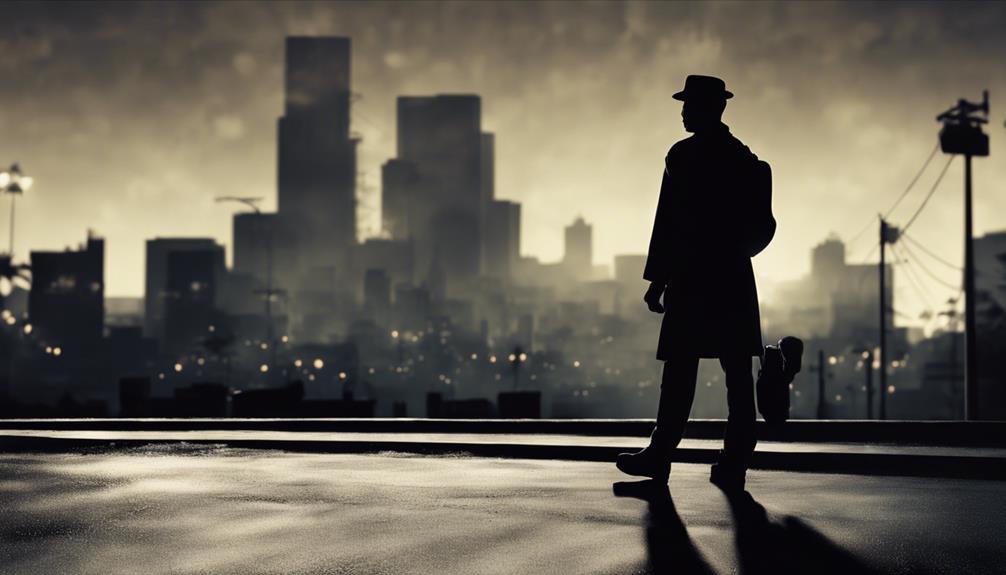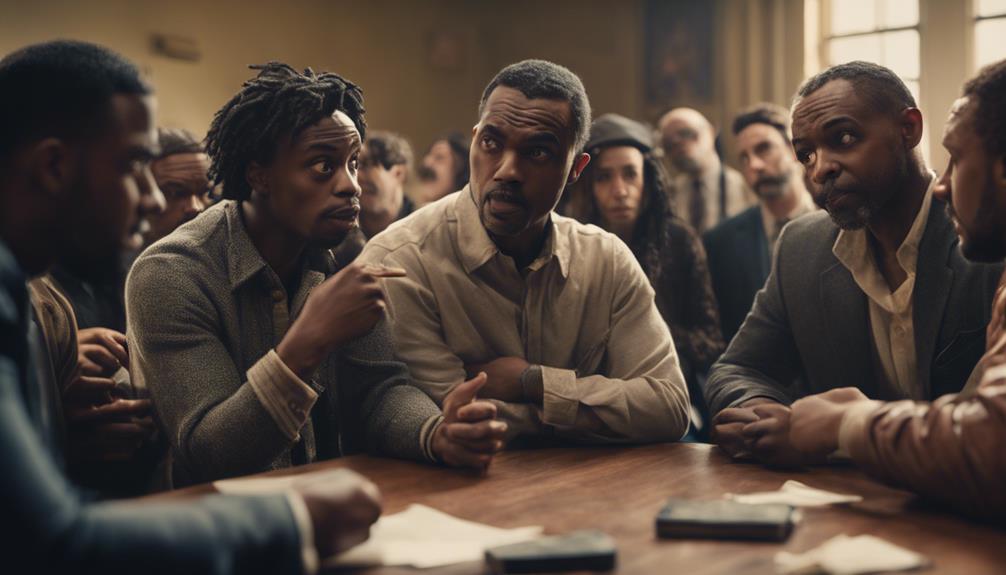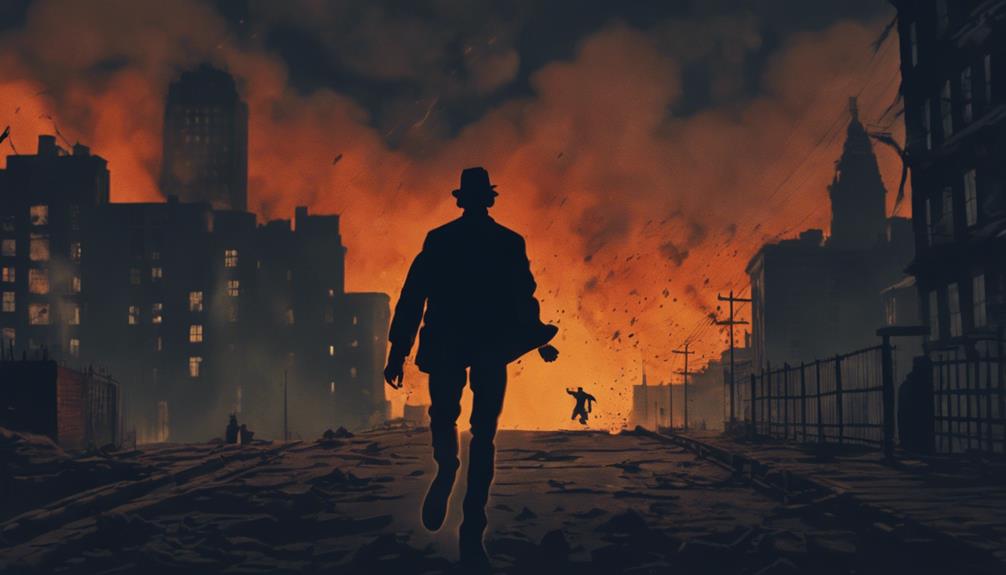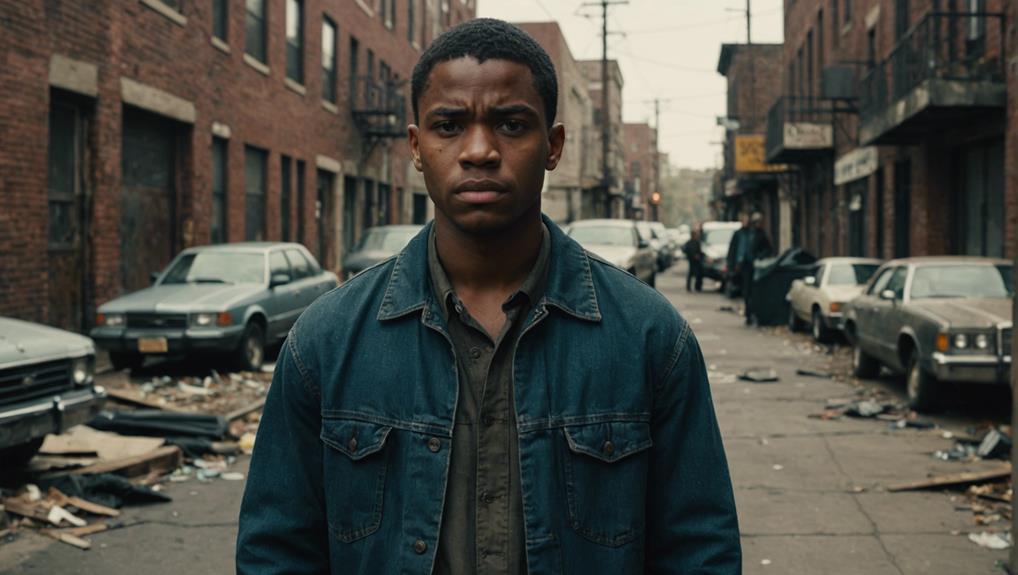Immerse yourself in Richard Wright's 'Native Son,' following Bigger Thomas's tumultuous journey through 1930s Chicago. Triggered by an accidental killing, Bigger's life unravels amidst fear, racial prejudice, and systemic injustice. His descent into violence and desperation leads to a tragic trial and a haunting death sentence. Explore societal struggles, racial tensions, and profound themes like racism and power dynamics in this gripping narrative. Unravel the complexities of Bigger's story, his interactions with symbolic characters, and the harsh realities he faces. Discover the impact of racism on Bigger's life and society's role in shaping his fate.
Plot Overview
In Richard Wright's novel 'Native Son', the plot centers around Bigger Thomas, a young Black man in 1930s Chicago's South Side. His accidental killing of Mary Dalton, the daughter of his employer, sets off a chain of tragic events. This murder, rooted in a mixture of fear, racial prejudice, and systemic causation, propels Bigger into a spiral of violence and desperation.
As an African American grappling with the harsh realities of poverty and societal structures designed against him, Bigger's actions reflect a broader commentary on the dehumanizing effects of racism and oppression.
The aftermath of Mary Dalton's murder leads to Bigger's trial, where he ultimately confesses and receives a death sentence. Through this journey of fear, flight, and fate, Richard Wright vividly portrays the harsh realities faced by Black individuals in a racially divided society, shedding light on the complexities of power dynamics and the devastating impact of systemic injustice.
Character Analysis
Bigger Thomas, the protagonist of 'Native Son,' explores the struggles faced by a young Black man in 1930s Chicago's racially charged society. Bigger's character analysis reveals the complexities of his experiences.
Mary Dalton, a symbol of rebellion against societal norms, unwittingly sets off a chain of events leading to tragic consequences in Bigger's life.
Henry Dalton represents the systemic oppression and racial inequality that weigh heavily on Bigger's existence.
Jan Erlone, with his Communist beliefs, offers a contrasting view on social justice, challenging Bigger's perceptions.
Bessie, Bigger's girlfriend, becomes entangled in his criminal activities, highlighting the destructive impact of societal pressures on personal relationships.
Through these characters, Richard Wright delves into the intricacies of race, poverty, and power, shaping Bigger's journey from a young man trapped by circumstances to a figure grappling with the harsh realities of his environment.
Literary Significance

Native Son's literary significance lies in its powerful exploration of themes like systemic racism, poverty, and societal expectations through the character of Bigger Thomas.
The novel's impact on society is evident in how it continues to spark discussions on race, class, and justice. Additionally, the controversial nature of the book's content has cemented its place in school curricula for fostering dialogue on important societal issues.
Themes in Novel
Throughout Richard Wright's 'Native Son,' the exploration of systemic racism, power dynamics, and societal injustice captivates readers with its raw and unflinching portrayal.
In the novel, the themes of race relations in America, the systemic causation behind racial inequality, and the consequences of racial blindness are vividly depicted.
The story unfolds within the backdrop of 1930s Chicago, where Bigger, a young black man, grapples with the oppressive white society and his own inner turmoil.
The wild chase that ensues highlights the stark contrast in social conditions between African Americans and whites, shedding light on the far-leftist leanings of the author.
Wright's narrative challenges readers to confront the realities of racial prejudice, the impact of societal power dynamics, and the harsh consequences of marginalization.
'Native Son' stands as a poignant reflection on identity, redemption, and the complex nature of the human experience.
Character Analysis
Delving into the character dynamics of 'Native Son' reveals a tapestry of individuals whose actions mirror the complexities of societal structures and racial tensions. Bigger Thomas, the marginalized Black man at the center of the narrative, grapples with fear and anger, embodying the harsh realities of systemic racism.
Mary Dalton, who challenges social norms, unwittingly sets off a chain of tragic events in the novel. Jan Erlone, Mary's boyfriend, emerges as a character striving for justice and understanding in the face of societal expectations.
Henry Dalton symbolizes the oppressive business practices contributing to racial inequality that Bigger Thomas confronts. Each character in 'Native Son' is intricately woven into the fabric of the narrative, reflecting Richard Wright's profound exploration of the human condition within the context of systemic racism and societal pressures.
Through their flaws and complexities, these characters serve as a lens through which readers can analyze the impact of societal structures on individual lives.
Impact on Society
Exploring the literary significance of 'Native Son' reveals its profound impact on societal conversations surrounding race, class, and justice. Richard Wright's portrayal of Bigger in 'Native Son' challenged societal prejudices and injustices by highlighting systemic racism. The novel sparked discussions on racial inequality and the effects of societal structures on marginalized individuals.
Today, Wright's work remains relevant, shedding light on ongoing racial themes and societal issues. 'Native Son' serves as a powerful critique, shaping conversations on race in literature and beyond.
- 'Native Son' sparked discussions on race, class, and justice in mid-20th century America.
- The novel challenged societal prejudices and injustices through its portrayal of systemic racism.
- Richard Wright's work in 'Native Son' remains relevant today in shedding light on racial themes and societal issues.
- The book offers insights into the human condition and the impact of societal structures on marginalized individuals.
- 'Native Son' serves as a powerful critique of racial inequality and systemic oppression, shaping conversations on race in literature.
True Crime Influence
How did the 1938 arrest and trial of Robert Nixon influence the narrative of 'Native Son'?
The real-life crime of Robert Nixon, executed for brick bat murders in Los Angeles and Chicago, seeped into Richard Wright's novel, shaping its trajectory.
The Daltons in 'Native Son' mirror societal fears and the desperation felt by marginalized individuals.
Mary's character, particularly Bigger's arousal towards her, explores complex psychological depths, showcasing the impact of external influences on character development.
Wright's decision to include scenes of illegal activities, later restored by editor Arnold Rampersad, adds layers of authenticity to Bigger Thomas's motivations and actions.
The true crime influence in 'Native Son' not only heightens the sense of fear and societal pressure but also underscores the intricate web of circumstances that can drive individuals towards drastic measures.
Allusions and References

Within 'Native Son,' Richard Wright masterfully weaves literary allusions and references to enhance the depth and symbolism of the novel.
As a young African American growing up in Chicago's South Side, Wright drew inspiration from real-life events and his own experiences in the Jim Crow South.
- References to the Scottsboro Boys case and the Great Migration provide historical context and enrich the narrative.
- The title 'Native Son' itself symbolizes the struggle for identity faced by African Americans in a racially divided society.
- Wright's use of biblical allusions, like the cross and the serpent, adds layers of meaning to the story.
- Allusions to Communist ideology reflect the political climate and influence characters such as Jan Erlone, a Communist party organizer.
- The novel's portrayal of the harsh realities faced by African Americans, including racism and economic struggles, is heightened through references to a real estate company exploiting the community.
Adaptations in Media
Let's talk about the adaptations of 'Native Son' in various forms of media.
From the 1951 feature film by Pierre Chenal to the 2019 HBO version starring Ashton Sanders, these adaptations bring new perspectives to the story.
They've influenced audiences and critics alike, sparking discussions on race, society, and the human condition.
Media Adaptation Overview
Explore the dynamic adaptations of 'Native Son' across various forms of media, highlighting the diverse interpretations of Bigger Thomas and the novel's themes.
From feature films to stage productions, 'Native Son' has been reimagined in different mediums, offering unique perspectives on Richard Wright's masterpiece.
Here are some key points to take into account:
- 'Native Son' has been adapted into feature films multiple times, with the most recent version released in 2019.
- Stage productions of the novel consider different interpretations of Bigger Thomas and the underlying societal issues.
- The influence of 'Native Son' extends to various works in film, music, and television, showcasing its enduring impact on popular culture.
- Adaptations of the novel have encountered challenges in casting and reception, reflecting the complexities of translating such a powerful narrative to different media formats.
- The diverse adaptations of 'Native Son' provide varying viewpoints on Bigger Thomas' character and the societal issues addressed in Richard Wright's seminal work.
Impact on Audience
The adaptations of 'Native Son' in various forms of media have left a profound impact on audiences, resonating with viewers through its themes of racism, fear, and social injustice. Bigger Thomas, the novel's protagonist, serves as a powerful vehicle for exploring the complexities of race relations and societal issues.
The controversial nature of the story has sparked discussions and debates, challenging audiences to confront uncomfortable truths about systemic racism and the consequences of fear and social injustice.
These adaptations haven't shied away from portraying the harsh realities faced by Bigger Thomas, leading to mixed reactions from viewers. The character's struggles and the exploration of deep-rooted societal issues have captivated audiences, prompting reflection on the enduring relevance of Wright's narrative.
Each adaptation offers a fresh perspective on Bigger Thomas' journey, further emphasizing the pervasive impact of racism and social injustice on individuals and communities. Through different mediums, 'Native Son' continues to provoke thought and stimulate conversations about these critical themes.
Critical Reception
Adaptations of 'Native Son' in various media forms have garnered critical reception, reflecting the diverse interpretations of Bigger Thomas and the handling of the novel's themes. The adaptations have faced challenges in translating the complexities of Richard Wright's work to the screen, particularly in addressing issues of social injustice, race, and identity.
The 1951 film adaptation encountered difficulties in casting a black lead actor for the role of Bigger Thomas.
The 2019 modern adaptation of 'Native Son' shifted the narrative to a contemporary setting, updating the story for a new audience.
Musician Saul Williams has drawn inspiration from 'Native Son' in his own work, exploring themes of systemic oppression and racial discrimination.
TV series like 'Brave New Voices' have been influenced by the novel, delving into similar themes of racism and societal injustice.
Various adaptations of 'Native Son' have elicited mixed critical reception for their interpretation of Bigger Thomas and their handling of the source material.
Critical Reception

Receiving critical acclaim upon its publication in 1940, 'Native Son' sparked vibrant discussions on race, poverty, and societal injustices. Richard Wright's depiction of Bigger Thomas, a young African American man trapped in a cycle of poverty and racial tensions, prompted intense debates on systemic racism and racial inequality. Critics praised Wright's unflinching portrayal of the harsh realities faced by Bigger, highlighting the novel's powerful social commentary.
While some lauded the novel for its literary impact and bold exploration of pressing social issues, others criticized its depiction of violence and questioned its representation of race relations.
Despite the mixed reactions, 'Native Son' remains a significant work in American literature, continuously studied and analyzed for its deep insights into the complexities of race, poverty, and the injustices prevalent in society. Wright's bold narrative style and poignant storytelling continue to resonate with readers, ensuring the novel's enduring relevance in discussions surrounding race and social justice.
Analysis of Themes
Exploring themes of racism, power dynamics, and social injustice, 'Native Son' delves into the intricacies of identity and the harsh realities faced by marginalized individuals in society. Within the narrative, the character of Bigger, a Black man in a mostly white society, grapples with the pervasive effects of racism and oppression, shedding light on the following key themes:
- Racism and Identity: The systemic racism prevalent in society shapes Bigger's actions and influences his sense of self.
- Power and Oppression: Disparities in wealth and societal power structures perpetuate the oppression faced by Bigger and other marginalized individuals.
- Social Injustice: The novel critiques the racial inequalities and societal expectations that contribute to the cycle of poverty and despair.
- Fear and Anger: Emotions such as fear and anger drive Bigger towards tragic outcomes, reflecting the impact of societal conditioning.
- Redemption and Justice: Through characters like Jan and Max, a path towards understanding, equality, and redemption is illuminated, offering a glimpse of hope amidst the prevailing themes of injustice.
Summary and Quotes

Delving into the depths of Bigger Thomas's journey in 1930s Chicago, 'Native Son' uncovers a narrative rich in turmoil and stark realities. Bigger Thomas's descent into crime is fueled by a potent mix of fear, anger, and societal pressures, culminating in tragic outcomes. The novel serves as a poignant exploration of racism, poverty, identity, and systemic injustice through the lens of Bigger's harrowing experiences.
Quotes from the book vividly capture Bigger's inner turmoil and the harsh truths he confronts. One such quote, 'You never did get the chance to know what I wanted,' encapsulates Bigger's frustration at being misunderstood and marginalized in a prejudiced society. Another quote, 'I'm scared, that's all,' lays bare Bigger's vulnerability and the pervasive fear that shapes his actions.
Richard Wright's masterful storytelling lays bare the psychological and social impacts of racism on Bigger's life, painting a gripping portrait of a man caught in the tumultuous currents of his time.
Conclusion
To sum up, Richard Wright's 'Native Son' is a powerful novel that shines a light on the harsh realities of racial inequality and systemic oppression.
Like a mirror reflecting society's deepest flaws, this story compels us to confront uncomfortable truths about the human condition.
Through the character of Bigger Thomas, Wright delivers a poignant message about the destructive nature of fear and hatred.
'Native Son' remains a timeless and essential read that challenges us to work towards a more just and equitable world.



